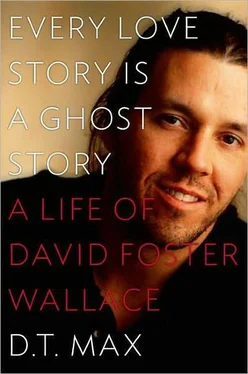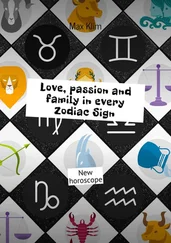CHAPTER 6. “Unalone and Unstressed”
In July 1993 the director of the Dalkey Archive, John O’Brien, and his son, met Wallace in front of his new house on North Fell Avenue in Bloomington. The two groaned as they carried Wallace’s weights up the stairs. Wallace had rented the house sight unseen from one of the members of the search committee. It turned out to be pretty, with a fireplace and a screened-in porch, opposite a park. Wallace brought his silver velour recliner, put a spit can nearby, and papered the bathroom with manuscript pages from Infinite Jest , tennis competition charts, and an adult diaper wrapper. 1
Returning to the Midwest brought mixed feelings for the thirty-one-year-old writer. He was particularly wary about being so close to his mother while he was fictionalizing her in his novel. He was drawing her as the lens of therapy had revealed her to him. Avril Incandenza is the seductive puppetmaster of Enfield Tennis Academy. When she speaks, Wallace wrote, everyone inclines their heads to her “very subtly and slightly, like heliotropes.”
And Wallace missed Karr. He had spent the last few months of his time in Syracuse mostly in exile, anxious he’d have to be recording the arrival and departure of “different masculine-model cars” in front of her house, as he wrote Corey Washington in March. He had brought her with him though as a character in his book. Joelle Van Dyne, also known as Madame Psychosis, is a radio show host and drug addict in recovery at Ennet House, a woman who keeps her face veiled either because it is hideously disfigured or because she is so beautiful that every man who sees it falls in love with her. She stars in “Infinite Jest,” the lethal video cartridge.
Predictably, Wallace worried about going back to teaching. He had been writing at an unequaled pace for two years and feared the change to his routine. But he was also an adult now, a man three and a half years sober with a job and a house and an advance for the book he was well under way with. That’s what it meant to live under the new administration of fun: no more irony and distance, commitment not spectation (a favorite word of his), involvement . And even, where possible, the hope of redemption. “Really good fiction could have as dark a worldview as it wished,” he told Larry McCaffery in the Review of Contemporary Fiction interview, which came out just as he arrived in Bloomington, “but it’d find a way both to depict this world and to illuminate the possibilities for being alive and human in it.” The writer’s job was to give “CPR to those elements of what’s human and magical that still live and glow despite the times’ darkness.” He added, “Fiction’s about what it is to be a fucking human being.” Wallace had always preferred certainty to unclarity, passion to incrementalism, and now he was a full-fledged apostle of sincerity. He had no tolerance for the person he was and gave no quarter to writers whom he thought were like the writer he used to be. When Steve Moore wrote him to recommend a novel he was publishing, praising its “sardonic worldview perfect for the irony-filled nineties,” Wallace shot back that this was “like saying ‘a kerosen[e]-filled fire extinguisher perfect for the blazing housefire.’”
Wallace was particularly allergic to those who dreamt of fame instead of achievement. He took every opportunity to point out to young writers the snares of the sort of early success he had had. He wrote Washington that whenever younger people asked him how to become an author his reaction was to be “polite and banal.” He pointed out, “The obvious fact that the kids don’t Want to Write so much as Want to Be Writers makes their letters so depressing.” To one such inquirer, a young man in his early twenties, he gave some unbending advice: “Take this time to learn to be your own toughest critic and best friend…. I wish I had…. Concentrate on the work, loving it and hating it and making it the best and truest expression of yourself it can be; the publishing stuff will come.” He added, “I’m mostly saying this to myself at 22, 23.” When Washington asked him if he himself had a swelled head, Wallace demurred: “Even a marginal soap-opera actor receives exponentially more mail than Bellow, I’m sure. And I’m no Bellow,” adding by hand “(yet!),” then a trademark smiley face to deflate his own boast. He went on:
I did, very briefly, at an artist colony called Yaddo in 1987, meeting McInerney and some of the other celebs, get a big head and believe for a few months that I was destined for celebrity, Letterman appearances. Etc. The rather brutal intervening years have taught me that, though there’s nothing de facto wrong with that stuff, it’s not for me, simply because it’s low-calorie and unstimulating and also highly narcotic. McInerney’s big job now is acting as a custodian for the statue of himself that celebrity has constructed.
Alone in the summer heat of the Illinois flatlands, Wallace tried to make life as much like Syracuse as he could. He found tennis courts, a gym, a therapist, and a substance abuse recovery group. The group Wallace liked met in a church on Oakland Avenue at noon. It was made up mostly of working-class people. He was a surprise to them. When he walked in for the first time, in his torn T-shirt, work boots, and bandana, several members took him for homeless. Soon he had become a literal fixture there — he took the same seat at every meeting. The members loved the way he talked — for many he was the most articulate person they had ever met — and felt his elaborate, run-on narratives of the daily battle to maintain the equanimity that kept him sober expressed what they were thinking, only better. As ever, it fell to them to tell him not to live so much in his head. They made fun of him for being too analytical and offered him slogans like “Keep It Simple” and “Be Nice to Myself” and “Stop Trying to Figure Everything Out.” For God, they’d suggest, he should just substitute “Good Orderly Direction.” “A grateful heart will never drink,” they might add. The banality of the responses maddened Wallace, but here he was drug- and alcohol-free after almost four years, thanks to people like them. “It starts to turn out that the vapider the AA cliché, the sharper the canines of the real truth it covers,” he would write in Infinite Jest . “I don’t know how recovery works,” he would tell friends, “but it works.” He was always available to help other members with both spiritual and practical questions, rewriting their job applications or professional correspondence. He attended a second recovery meeting at the Lighthouse Institute, where he sponsored addicts who had been ordered by courts to attend a recovery program. It came under the rubric of “pay it forward” that he had learned at Granada House: if you help someone, when you need help someone will be there for you too.
The other members began looking after him in turn. They saw him — and he played to this — as a sort of holy fool. A former judge started giving Wallace his cast-off clothes. The daughter of another recovery member brushed Wallace’s long, unruly hair (he refused her offer of conditioner). If his computer crashed, someone from recovery came and rescued his files. Familyless, he was adoptable — one couple hung a stocking for him every Christmas. Wallace went through a number of sponsors until he found one he liked, a man who had entered the program after falling out of a tree while high. The accident had broken his back, made it necessary for him to use two metal canes. He was incontinent and had to go to the “john,” Wallace wrote a friend in a later letter, “like every fifteen minutes.” But Wallace used him to tamp down his own self-absorption. “He’s extremely helpful,” he explained, “as just a plain nonverbal model of what Real problems are when I think I’ve got Problems.”
Читать дальше












